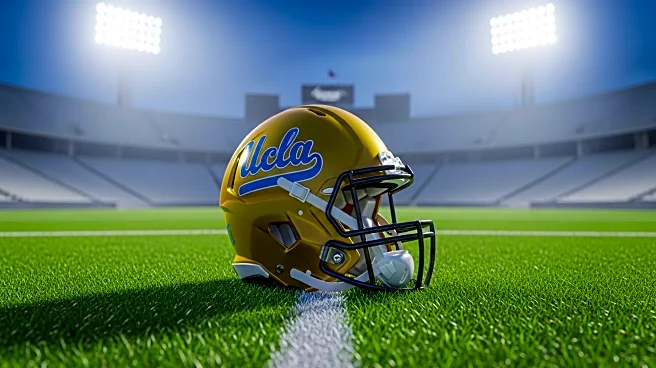What's Happening?
UCLA's football team is undergoing significant changes under the leadership of Coach DeShaun Foster. After a challenging debut season in the Big Ten, where the team finished 5-7 overall, Foster has made substantial adjustments to both the coaching staff and player roster. A key addition is quarterback Nico Iamaleava, who transferred from Tennessee to lead the Bruins. Iamaleava is part of a group of 55 new players joining the team, along with eight new assistant coaches. The Bruins aim to improve their performance, having not achieved a double-digit win season since 2014. Offensive coordinator Tino Sunseri, who previously helped Indiana reach the College Football Playoff, is expected to bring his expertise to UCLA's offensive strategy. The team also includes several transfers on the defensive side, aiming to enhance their overall performance.
Why It's Important?
The overhaul of UCLA's football team is crucial for its competitiveness in the Big Ten Conference. The addition of Nico Iamaleava and other new players could significantly impact the team's dynamics and performance. With a history of underwhelming seasons, these changes represent a strategic effort to elevate the team's standing and potentially secure more victories. The involvement of experienced coaches like Tino Sunseri could provide the necessary leadership and tactical improvements. This transformation is not only important for UCLA's athletic reputation but also for its recruitment and future prospects in college football.
What's Next?
UCLA's upcoming schedule includes challenging games against top-ranked teams such as Penn State, Indiana, and Ohio State. These matches will test the effectiveness of the new roster and coaching strategies. The team's ability to integrate new players and adapt to the revamped coaching style will be critical in determining their success. Observers will be watching closely to see if these changes lead to improved performance and potentially a return to bowl game appearances.
Beyond the Headlines
The extensive changes at UCLA reflect broader trends in college football, where teams increasingly rely on transfers and strategic coaching hires to remain competitive. This approach highlights the evolving nature of team building in collegiate sports, emphasizing adaptability and resourcefulness. The success of UCLA's strategy could influence other programs facing similar challenges.









